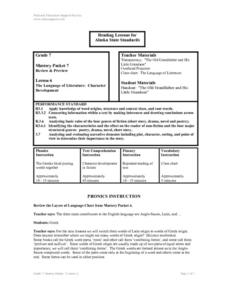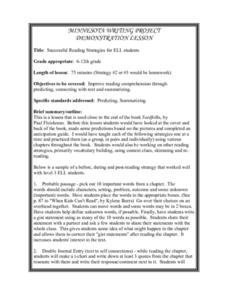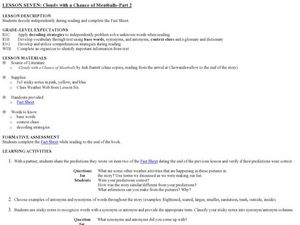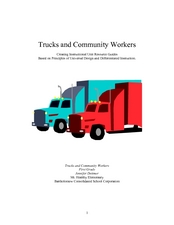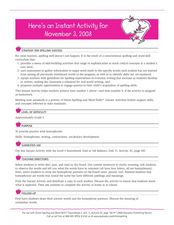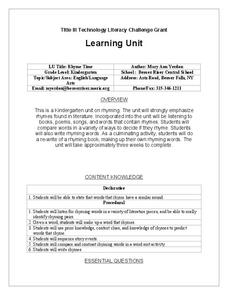Curated OER
Greek Origins and Character Development
Seventh graders examine words of Greek origin and discuss character development in fiction. They read a list of Greek word parts and create words on a worksheet. Students then read and discuss an informational handout about character...
Curated OER
Successful Reading Strategies for ELL Students
Students improve their reading comprehension through predicting, connecting with text and summarizing. Students should have already read the book Seedfolks and made predictions based upon what they had seen from the cover and pictures...
Curated OER
Rollin’ on the River: Identifying Jargon
Students identify jargon in poetry, prose and fiction. In this literature lesson, students will read selections from Mark Twain and identify figurative langauge, focusing on jargon.
Curated OER
Cloudy with a Chance of Meatballs - Part 2
Students recognize synonyms and antonyms. In this reading strategies lesson, students use the book Cloudy with a Chance of Meatballs by Judi Barrett to make predictions, and correctly recognize synonyms and antonyms.
Curated OER
Esperanza Rising: Lesson 3
Sixth graders read parts of the book Esperanza Rising and define vocabulary words connected to it. In this Esperanza Rising lesson plan, 6th graders illustrate words and discuss the sections of the books they read.
Curated OER
Trucks and Community Workers
First graders identify community helpers and their roles. In this transportation lesson, 1st graders complete a series of lessons integrating technology and literacy. Students decode sounds of short u, c/s/ and g/j/ words and improve...
Curated OER
Reading and Responding: Lesson 6
Teacher reads aloud to the students the material that is printed in boldface type inside the boxes. Information in regular type inside the boxes and all
information outside the boxes should not be read to students. Possible
student...
Curated OER
Let's Roll Robots!
Students write a story about robots. In this creative writing activity, students read a story about robots, make their own robot, and write a story about their robot. In addition, the lesson plan suggests taking photos of the robots to...
Curated OER
What's Missing?
Learners examine their beliefs about archaeological preservation. They articulate a response to archaeological resource destruction. Students then complete two puzzles and relate them to archaeological research.
Curated OER
Using A Dictionary
Young scholars explore English by completing a word definitions worksheet. For this dictionary lesson, students practice locating a list of vocabulary terms in a "Dictionary Race." Young scholars complete a worksheet based upon word...
Curated OER
Prehistoric Native American Lesson Plan: Pictionary with the Past
Pupils participate in a vocabulary exercise at a website dedicated to Prehistoric Native Americans.
Curated OER
Gearing up for Grammar
Young scholars input autobiographical information to apply in a Diamante' poem that utilizes the different parts of speech. Students interact with each other sharing their autobiographical information completed on the database created....
Curated OER
Spelling: Homophone Review
Third graders practice using homophones. In this homophones lesson, 3rd graders review what makes a word a homophone and use clues to complete a worksheet that requires them to write in the correct homophone.
Curated OER
Rhyme Time
Students listen to a variety of stories and identify rhyming words. They sequence events in the story and generate rhymes of their own. They sort words by rhyming families and write rhymes of their own.
Curated OER
Reading Comprehension
First graders listen and read along as a story is read to them. They discuss what they read when finished with the text. Students discuss the story vocabulary and the word meanings. They practice decoding unknown words and complete a...
Curated OER
My Secret War - The WWII Diary of Madeline Beck: Lesson 2
Fifth graders explore world history by reading historical fiction. In this World War II lesson, 5th graders read the story My Secret War and identify the importance of fiction when analyzing history. Students answer study questions about...
Curated OER
Using Pictures to Promote Conversation
Students initiate and sustain a conversation of three or more exchanges on a topic while exploring a collection of large photographs pertaining to that topic. The teacher creates a comfortable setting and provide a variety of books...
Curated OER
ADULT ESOL LESSON PLAN--Government and Community Resources
Students, after reviewing/examining a lengthy list of vocabulary terms, explore and identify government officials, especially the current United States President. They view a variety of pictures with government officials on them and...
Curated OER
Express Yourself!
First graders work as a group to generate and play a game that displays an understanding of developmental level reading vocabulary based on a grade level checklist. This lesson plan really engages the creative side of your students!
Curated OER
ESOL Government and Community Resources
Students view pictures of government official and identify each by name and
title. They compare these U. S. officials with those in the students' native
countries then write a sentence about each of the officials.
Curated OER
Poetry
Fourth graders participate in reading and listening to poetry. They are exposed to a variety of poems and examine and identify basic elements of poetry. They write their own poems and recite a poem with enthusiasm, expression, and props.
Curated OER
Sarah, Plain and Tall
Third graders experience what life was like during era in which "Sarah, Plain and Tall depicts using modern technology.
Curated OER
I'm 93, But Quitting Job Would Drive Me Off My Trolley
Students read and discuss a news article about the elderly in the workplace. They use the content of the article for practice in making predictions, determining verb tense, and basic comprehension.
Curated OER
Timely Fashions
Students research a topic chosen by the instructor in a selected region where the target language is spoken. They research the topic using available traditional and internet resources to prepare a presentation of their findings:
